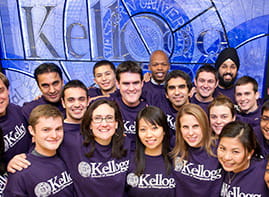6/20/2016 -
Don Haider, a professor of strategy and director of the Center for Nonprofit Management, will retire from Kellogg and from his role as director of the
Kellogg Board Fellows this spring.
A cornerstone of Kellogg’s social impact ecosystem, the board fellows program expands students’ awareness about the critical role that management plays in society by cultivating them to become leaders in the nonprofit space.
Haider helped develop the program, now in its 13th year, alongside a trio of students who were interested in working with nonprofit organizations while at Kellogg. The program trains 50 students a year in board governance, then places each of them on the boards of a single nonprofit as non-voting members.
Since the program’s launch, more than 500 students have served on the boards of nearly 200 different organizations.
At the program’s annual breakfast this May, which brings together nonprofits from across the Chicago area and the Kellogg students committed to nonprofit board governance, Haider was honored for his work. In addition to creating and shepherding the board fellows program, Haider was integral in heralding social impact and nonprofit management education during his 43-year tenure at Kellogg.
A former White House fellow, assistant secretary to the U.S. Treasury, and budget director for the City of Chicago, Haider brought a vast portfolio of experiences from Washington, New York City and Chicago to his Kellogg teaching, which included courses in finance, real estate and nonmarkets strategy.
“Kellogg was one of the first business schools of its caliber to have a focus on public and nonprofit management. And, in large part, that was due to the fact that Don assumed responsibility for that program and engaged faculty,” says
Liz Livingston Howard, a clinical associate professor of management and director of
Nonprofit Executive Education. “He engaged practitioners from the community, and promoted Kellogg as the place to come if you were interested in serving in the public nonprofit sector either as a paid professional or as a board member.”
Education and service combined
An increasingly competitive program, hundreds of students apply to become Kellogg Board Fellows each year. From that applicant pool, a student leadership team selects 50 fellows, who are later matched with a nonprofit.
During their fellowship, students take academic courses in nonprofit governance, policies and procedures. They also are required to complete a project for their organization, such as identifying board governance best practices or studying marketing performance metrics.
In return, the boards are expected to mentor students and allow them to participate as fully as possible in board activities.
As director, Haider taught the coursework for fellows and advised on handling the challenges of nonprofit governance, says Katherine Finnegan ’16, outgoing president of the Kellogg Board Fellows.
“Professor Haider is a wealth of knowledge,” says Finnegan. “He was constantly reminding us that no board will be perfect, but shared strategies to work through such changes with the board and leadership team.”
For Haider, establishing the board fellows was a natural extension of his work in what used to be known as the Public Nonprofit Program at Kellogg. Leveraging the vibrant, active nonprofit environment of Chicago, Haider had the opportunity to build one of the first experiential learning classes at Kellogg and provide business students with a service option they wouldn’t find at other schools.
“It's a good training,” says Haider. “It gives you a leg-up in terms of experience in work and service as being a board member, which you probably wouldn't otherwise get until later in your professional years.”
Alumna returns to lead program
With Haider retiring, Sophia Shaw ’99 has been tapped to join Kellogg as director of the board fellows program. Shaw has built a distinguished career in the local nonprofit scene, including a 10-year stint as president and CEO of the Chicago Botanic Gardens before stepping down from that role last summer.
During her tenure at the 385-acre living museum and science center, Shaw grew annual attendance, oversaw five years of record-breaking fundraising growth and launched “Keep Growing,” a ten-year strategic plan that includes a $125 million capital and endowment campaign.
Excited about returning to Kellogg — “It feels fantastic,” she says — Shaw plans to take her cues from student leaders to determine what they and local nonprofits need.
“There is nothing broken that needs to be fixed or expanded immediately,” says Shaw, who will also serve as an adjunct lecturer. “My mandate really was very clear: Take an already excellent program and make it more excellent.”
As for Haider, he says the program he helped build is in very good hands with Shaw, who has both the experience and passion for service needed to lead for a long time.
“She is well wired and networked to take this to the next level, the next stage,” he says.






